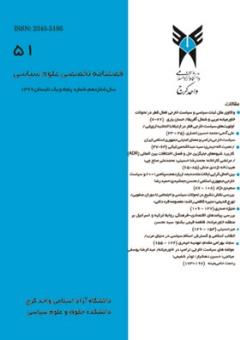تحلیل جامعه شناختی تاثیرات روند جهانی شدن بر فرهنگ سیاسی از منظر زنان ایرانی (1402-1392
محورهای موضوعی : جامعه شناسی سیاسی
عارف رحیمی
1
![]() ,
محمد رضا قائدی
2
,
محمد رضا قائدی
2
![]() ,
ارسلان قربانی
3
,
ارسلان قربانی
3
1 -
2 - دانشیار دانشگاه آزاد شیراز
3 - رئیس انجمن علوم سیاسی
کلید واژه: جهانیشدن, فرهنگ سیاسی, زنان, تحلیل جامعهشناختی.,
چکیده مقاله :
پژوهش حاضر با هدف تحلیل جامعهشناختی تأثیرات روند جهانیشدن بر فرهنگ سیاسی از منظر زنان ایرانی (1402-1392) انجام شده است. در این پژوهش از رویکرد کیفی و روش پدیدارشناسی تفسیری استفاده شده و جامعه آماری آن را زنان شاغل بین بيست تا پنجاه سال در طی سالهای 1392 تا 1402 تشکیل دادند. در این راستا با استفاده از روش نمونهگیری هدفمند با 12 نفر مصاحبه شد. گردآوری دادهها از طریق مصاحبه نیمه ساختاریافته عمیق انجام شده و دادههای بهدستآمده با استفاده از نظریه داده بنیاد و به روش کدگذاری سه مرحلهای اشتراوس و کوربین (۱۹۹۰) تجزیهوتحلیل شدند. بر اساس نتایج بهدستآمده، 11 مقوله اصلی (افزایش آگاهی، به چالش کشیدن هنجارهای سنتی، فرصتهای آموزشی، امنیت اقتصادی، فشار برای اصلاحات قانونی، تبادل فرهنگی، تغییرات در مشارکت سیاسی، کنشگری اجتماعی، اشتراکگذاری اطلاعات، برابری جنسیتی و کشف استعدادهای نهفته) در قالب ۴ بعد آموزشی-فرهنگی، اجتماعی، اقتصادی و سیاسی و 50 کد بازشناسی شدند. یافتهها از این دیدگاه نظری حمایت میکند که جهانیشدن، بر باورهای سنتی، مسائل اجتماعی و سیاسی، تبادلات فرهنگی، همگنسازی فرهنگی، هویت ملی، کنشگری دیجیتال، فرصتهای آموزشی، میزان آگاهی آنها تأثیر داشته است. درواقع، بر طبق نتایج، پدیده جهانیشدن نیرویی است که به زنان کمک کرده تا از آسیبها در حوزه حقوق سیاسی و اجتماعی مصون بمانند.
The current research was conducted with the aim of sociological analysis of the effects of the globalization process on political culture from the perspective of Iranian women (1402-1392). In this research, a qualitative approach and interpretive phenomenological method were used, and its statistical population consisted of working women between 20 and 50 years of age during the years 2012 to 2014. In this regard, 12 people were interviewed using the purposeful sampling method. Data collection was done through in-depth semi-structured interviews and the obtained data were analyzed using the foundational data theory and the three-step coding method of Strauss and Corbin (1990). Based on the results obtained, 11 main categories (increasing awareness, challenging traditional norms, educational opportunities, economic security, pressure for legal reforms, cultural exchange, changes in political participation, social activism, information sharing, gender equality and discovering latent talents) They were recognized in the form of 4 educational-cultural, social, economic and political dimensions and 50 codes. The findings support the theoretical view that globalization has had an impact on traditional beliefs, social and political issues, cultural exchanges, cultural homogenization, national identity, digital activism, educational opportunities, and their level of awareness. In fact, according to the results, the phenomenon of globalization is a force that has helped women to be protected from harm in the field of political and social rights.
1. بشیریه، حسین. (1378). جامعهشناسی سیاسی. تهران: نشر نی.
2. دشتی، فرزانه و محمدرحیم عیوضی (1397)، عوامل مؤثر در ارتقاء همگرایي اقوام ایراني در عصر جهاني شدن، پژوهشنامۀ انقلاب اسلامی، سال هشتم، (8doi.org/10.22084/rjir.2018.15222.2286 3. ساداتي نژاد، سيدمهدي؛ علايي آورگاني، جواد(1397)، « اسلام و جهاني شدن، ترابط يا تب(اين بررسي ديني پديده جهاني شدن بر اساس رهيافت گفتمان»، سياست- مجله دانشكده حقوق و علوم سياسي، 48(2)، 392-397. doi: 10.22059/jpq.2018.222480.1006978 4. Appadurai, A. (1996). Modernity at Large: Cultural Dimensions of Globalization, University of Minnesota Press, Minneapolis. 5. Caprara, GV., & Vecchione, M. (2017). Personalizing Politics and Realizing Democracy. New York: Oxford University Press. 6. Castells, M. (2009). Comunicación y poder. Madrid: Alianza Editorial. 7. Chan, C. S. (2011). Divorcing localization from the divergence paradigm: Localization of Chinese life insurance practice and its implications, International Sociology, 26 (3): 346-363. 8. Chowdhury, S. M. (2019). Reserved Seats for Women in the Parliament of Bangladesh—A Critical Analysis of Meaningful Representation. 9. Cullen, M. M., & Brennan, N. M. (2021). Grounded Theory: Description, Divergences and Application. Accounting, Finance & Governance Review, 27 (21), 1-19. 10. Featherstone, M. (1995). Undoing Culture: Globalization, Postmodernism and Identity, Sage Publications, London.


